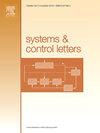Resilient abstraction-based hierarchical control of linear systems
IF 2.1
3区 计算机科学
Q3 AUTOMATION & CONTROL SYSTEMS
引用次数: 0
Abstract
This paper develops a resilient hierarchical control structure for cyber–physical systems (CPSs) using an extended resilient approximate simulation function. Data transmission through wireless communication channels in CPSs is vulnerable to cyber-attacks. Furthermore, these systems may be modeled using linear dynamics with high-state dimensions. Hence, the control synthesis problem for concrete systems is computationally challenging. The extended resilient approximate simulation function introduced in this paper enables the use of an abstract system for computationally efficient controller design. This function is mathematically defined as the sum of the resilient approximate simulation function between the abstract model and the unknown input observer (UIO), and the simple approximate simulation function between the UIO and the concrete system. Accordingly, the controller can first be designed for the abstract system and then refined for the concrete system by introducing an appropriate interface controller. This controller constitutes an observer-based robust control law based on to guarantee the desired performance despite external disturbances and includes an adaptive compensator to mitigate the effect of attacks on the simulation relation. The applicability of the presented approach is demonstrated through two case studies: load frequency control in a power system and frequency regulation in an isolated area of the New England 39-Bus Test System.
基于弹性抽象的线性系统层次控制
本文利用扩展弹性近似仿真函数开发了一种网络物理系统的弹性分层控制结构。通过无线通信通道传输数据的cps容易受到网络攻击。此外,这些系统可以使用具有高状态维度的线性动力学建模。因此,混凝土系统的控制综合问题在计算上具有挑战性。本文引入的扩展弹性近似仿真函数使抽象系统能够用于计算效率高的控制器设计。该函数在数学上定义为抽象模型与未知输入观测器(UIO)之间的弹性近似仿真函数和未知输入观测器与具体系统之间的简单近似仿真函数之和。因此,可以先为抽象系统设计控制器,然后通过引入适当的接口控制器来细化具体系统的控制器。该控制器构成了一个基于观测器的基于H∞的鲁棒控制律,以保证不受外部干扰的期望性能,并包括一个自适应补偿器,以减轻攻击对仿真关系的影响。通过两个案例研究证明了所提出方法的适用性:电力系统中的负载频率控制和新英格兰39总线测试系统中孤立区域的频率调节。
本文章由计算机程序翻译,如有差异,请以英文原文为准。
求助全文
约1分钟内获得全文
求助全文
来源期刊

Systems & Control Letters
工程技术-运筹学与管理科学
CiteScore
4.60
自引率
3.80%
发文量
144
审稿时长
6 months
期刊介绍:
Founded in 1981 by two of the pre-eminent control theorists, Roger Brockett and Jan Willems, Systems & Control Letters is one of the leading journals in the field of control theory. The aim of the journal is to allow dissemination of relatively concise but highly original contributions whose high initial quality enables a relatively rapid review process. All aspects of the fields of systems and control are covered, especially mathematically-oriented and theoretical papers that have a clear relevance to engineering, physical and biological sciences, and even economics. Application-oriented papers with sophisticated and rigorous mathematical elements are also welcome.
 求助内容:
求助内容: 应助结果提醒方式:
应助结果提醒方式:


